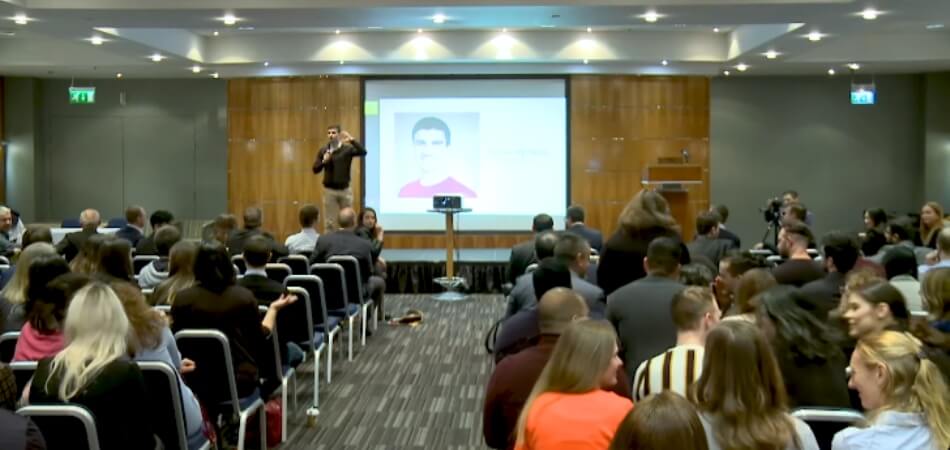When attending a conference, introverts often find it overwhelming, especially in its crowded atmosphere. The loud conversations, numerous unfamiliar faces, and the pressure to network can seem challenging.
But what if there was a way to turn this challenging environment into an enriching experience? The response lies in figuring out how introverts can make the most of conferences.
By adopting strategies such as joining lunch sessions, attending niche meetups, finding a supportive buddy, preparing in advance, and, for those moments of courage, initiating conversations, introverts can transform their networking experiences.
This approach makes attending conferences more manageable and opens doors to valuable connections. Dive into this blog to uncover these tried-and-true strategies in detail.
What Does a Conference Offer to its Attendees?
Conferences provide attendees with valuable opportunities to expand their knowledge and network. Through presentations, attendees gain insights into the latest trends and innovations. These conferences provide a platform for exchanging ideas and discussing challenges in a collaborative environment. Attendees leave with new perspectives that contribute to their professional growth.
Networking is another key benefit of attending conferences. Establishing relationships with peers and experts in the field can result in future collaborations. These connections often open doors to new opportunities, including partnerships or job prospects. Building a network within the industry is crucial for career advancement.
Conferences also offer a chance to stay updated on industry developments. Attendees can discover new tools, technologies, and methodologies that can be applied to their work. This knowledge can improve efficiency and effectiveness in their respective fields. Staying informed helps attendees remain competitive in an ever-evolving industry.
Are Conferences Best for Introverts?
Yes, conferences can be suitable for introverts. They offer structured environments where interactions can be planned rather than spontaneous. This allows introverts to engage at their own pace without feeling overwhelmed. Introverts can also choose sessions that interest them, providing a comfortable way to participate.
However, attending a conference as an introvert can present challenges. Large crowds and social expectations might be daunting for those who prefer solitude. Still, introverts can benefit by focusing on smaller group discussions. These settings are often more comfortable and allow for meaningful connections.
Overall, conferences can be a valuable experience for introverts if approached mindfully. Preparation and choosing the right sessions can make the experience enjoyable. By setting personal boundaries, introverts can navigate conferences effectively. The key is to balance participation with moments of rest and reflection.
Types of Conferences Perfect for an Introvert
Conferences can be challenging for introverts, but certain types are better suited for those who prefer quieter settings. The right environment can make all the difference in creating a positive experience. Choosing the right conference type helps introverts fully engage and benefit from these events.
Niche Industry Conferences
Niche industry conferences cater to specific interests, making them ideal for introverts. Attendees often share similar passions, facilitating deeper, more focused discussions. These conferences provide a sense of community, reducing the pressure to engage with large crowds. Introverts can easily connect with like-minded individuals, enhancing the experience.
Workshop-Based Conferences
Workshop-based conferences offer interactive sessions that focus on learning rather than networking. Introverts can engage with the material in a hands-on manner, which suits their learning style. These smaller, skill-focused groups reduce the need for extensive social interaction. The structured nature of workshops provides a comfortable environment for participation.
Academic Conferences
Academic conferences are often quieter, with an emphasis on knowledge sharing over socializing. These events attract individuals who value in-depth discussions and intellectual engagement. Introverts can comfortably participate in discussions that revolve around specific research or topics. The focus on content over networking makes these conferences less socially demanding.
Small-Scale Conferences
Small-scale conferences are perfect for introverts seeking a less overwhelming atmosphere. With fewer attendees, interactions are more manageable and meaningful. These events allow introverts to focus on quality connections rather than quantity. Smaller settings also make it easier to identify key moments to capture at a conference.
Virtual Conferences
Virtual conferences allow introverts to engage from the comfort of their own space. They offer flexibility in participation, reducing the stress of in-person interactions. Introverts can attend sessions, network online, and capture key moments at a conference without feeling overwhelmed. The ability to control their environment makes virtual conferences an appealing option.
How Introverts Can Make the Most of Conferences?
While often feeling overwhelmed in large social settings like conferences, introverts can still harness the value these events offer by approaching them strategically. Here are several strategies for introverts to make the most out of conferences:
- Prepare in Advance: Research the schedule, speakers, and topics beforehand. Having a clear plan helps navigate the event and target sessions of interest without feeling overwhelmed.
- Quality Over Quantity: Focus on forging a few meaningful connections rather than thinning yourself. Deeper conversations often resonate more than brief, surface-level ones.
- Find Quiet Corners: Most conferences have spaces where the noise and crowd are minimal. Utilize these spots for breaks to recharge mentally.
- Attend Niche Sessions: Smaller, topic-specific sessions can be less daunting and offer more opportunities for meaningful interactions.
- Use Technology: Many conferences have associated apps or online platforms. Engage in forum discussions or connect with attendees virtually first, making in-person interactions smoother.
- Partner Up: If you know someone attending, pair up. Having a buddy can reduce networking pressure and make sessions more enjoyable.
- Set Realistic Goals: Instead of aiming to network with everyone, set a target. It could be mingling at a conference with five new people or attending two networking events. This approach helps manage social energy effectively.
- Practice Active Listening: Remember, networking isn’t just about talking. Introverts often excel at listening, making interactions more insightful and memorable.
- Schedule Downtime: Ensure you allocate periods for rest. This could be heading back to your room, walking, or just sitting in a quiet space.
- Reflect Post-Conference: After the conference, take time to process the experience. Note down crucial learnings, follow up with contacts, and plan for future engagements.
Introverts can thrive at conferences by embracing their strengths, preparing adequately, and setting personal boundaries. It’s about finding a balance that works individually, allowing for networking and self-care.
How to Choose the Right Conference as an Introvert?
Choosing a conference as an introvert requires a thoughtful approach, balancing personal comfort with the desire for knowledge. It’s about finding an environment that facilitates learning while respecting one’s boundaries. Here’s a guide to help introverts make the right choice:
Step-1. Identify Your Objectives
Start by understanding what you want from the conference. Are you seeking knowledge, networking opportunities, or both? Clear objectives will guide your selection process more effectively.
Step-2. Research the Format
Different conferences have varying structures. If you’re heading to a North American country like Canada, you’ll find a range of conference formats designed to cater to different learning styles. In this case, choosing the right conference in Canada allows attendees to participate in a format that suits their learning preferences while maximizing engagement.
Step-3. Size Matters
Consider the size of the conference. Smaller gatherings can be less overwhelming, allowing for deeper interactions and a comfortable networking experience.
Step-4. Check Digital Offerings
Some conferences offer hybrid or virtual options. Engaging digitally can sometimes be more comfortable, with the freedom to participate at one’s own pace.
Step-5. Location and Venue
Evaluate the venue’s environment. Places with quiet areas or designated relaxation spots can be a haven for introverts during hectic schedules.
Step-6. Review the Agenda
A detailed agenda can help you prepare. Knowing the topics and speakers in advance allows for better time management and reduces potential anxieties.
Step-7. Seek Recommendations
Ask peers or mentors about their conference experiences. Personal recommendations can give insights into the ambiance and attendee demographics of the event.
Step-8. Step-. Trust Your Instincts
Lastly, trust your gut feeling. If a conference doesn’t resonate with your comfort level, it might not be the right fit.
The key for introverts is to ensure that the chosen conference aligns with both their learning goals and personal comfort. By following a structured approach and prioritizing their well-being, introverts can transform conferences into empowering experiences that enrich their professional journeys.
Last Words
Conferences are a goldmine of opportunities for professionals from all walks of life. While the bustling ambiance of such events might initially seem daunting for introverts, there are numerous ways to navigate them successfully.
By understanding how introverts can make the most of conferences, one can transform these events from overwhelming challenges into empowering experiences. From selecting the correct type of conference that resonates with their comfort zone to employing strategic approaches during attendance, introverts can maximize their benefits.
In essence, with the right tools and mindset, every introvert can unlock the full potential of conferences, nurturing professional growth, expanding networks, and fostering personal development in the process.








